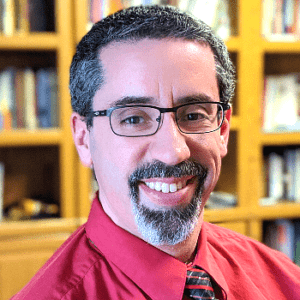“Remember, all journalists are soft targets, and are fair game in the coming revolution! Don’t be afraid to take reporters down by any means necessary!” — unknown user on Parler
“Get the firing squads ready.” — LLinWood on Parler
“Many of us will return on January 19, 2021, carrying our weapons … we will come in numbers that no standing army or police agency can match.” — Col. T. Perez (Ret) on Parler
The above is a small sampling of the kinds of posts that journalists and other observers say have been plentiful on the social media app Parler and other sites that are host to rampant extremism. I chose examples that were more tame. Others I have seen envision violence and torture in graphic detail.

Corey Fields
The seditious siege of the U.S. Capitol on Jan. 6, it turns out, was a highly and enthusiastically organized effort on such platforms, buoyed by a level of delusion and rancor that is hard to comprehend. It seems to have begun on Facebook as a group called “Stop the Steal” before it was taken down for misinformation and promotion of violence.
Journalist Sheera Frankel reports that posts included photos of supposed election malfeasance that were quite obviously Photoshopped, and members sharing what kinds of weapons they were going to bring with them to Washington, D.C. The Jan. 6 scene was rife with images of white supremacy, including nooses and neo-Nazi tattoos and clothing, and an obtained FBI memo warns of “a huge uprising” in the days to come that includes all 50 states.
Dangerous online radicalization has reached a tipping point, and although it’s not known precisely what percentage of this movement would identify as Christian, it appears to be shockingly large. Emma Green notes the verbal and written religious language within the Jan. 6 crowd, as well as the presence of a group called The Jericho March, which has since scrubbed all references to the Jan. 6 protest from its site.
Large-scale conspiracy theory networks like QAnon that play a large role in President Trump’s support have infiltrated the minds of believers. For years now, Christians, often privately in their homes and on their computers, have been consuming extremist, pseudo-Christian media claiming Trump’s presidency was prophesied or that have peddled the election fraud conspiracy and couched it in terms of spiritual warfare. One such YouTube channel has videos with view counts in the millions.
“For years now, Christians, often privately in their homes and on their computers, have been consuming extremist, pseudo-Christian media.”
This newest wave of white-supremacist backlash has been brewing for more than a decade, only temporarily “standing down” after the 2016 election. Shepherd Smith once shared on Fox News that he had started receiving “more and more frightening” and “out there” emails shortly after Barack Obama was elected, and at the end of the June 2009 clip quite prophetically said that “more and more it seems like people are taking the extra step and getting the gun out.”
After Sept. 11, 2001, there was a large increase in efforts to study Islamic extremist groups and how they manage to radicalize people and recruit them to such a cause. A report by the American Enterprise Institute, endorsed by the United Nations, notes factors like the search for group-based identity, cultural grievances, perceived threats and economic vulnerability. We have seen these exact dynamics play out in white, traditionally Christian America, especially through the powerful influence of Christian nationalism.
So, millions of Americans are now fully radicalized, and white evangelicals in the mix. What do we do? We may feel helpless in the midst of all this, but I offer a few thoughts and action items for churches and believers. There is much we can’t control, but here’s what we can do:
First, prepare to show up and take (non-violent) action. I hope and pray otherwise, but we should heed indications that Jan. 6 was only a prequel. If this is the case, we cannot allow the violent and the hate-filled to be the only ones organizing and showing up. Churches all over the nation should consider organizing peace walks, “pray-ins,” and other public demonstrations for a better way.
“We cannot allow the violent and the hate-filled to be the only ones organizing and showing up.”
AME pastor William H. Lamar IV penned a prudent exhortation that our collective response to this must go far beyond kindness and sentiment. “Doing something sweet for people who have suffered, especially in response to spiritual stirrings, can teeter on the edge of escapism. It can shield us from doing the hard work of figuring out why people suffer and how we can alleviate that suffering.”
Second, we can’t change minds, but we must reclaim Jesus. One cannot change the mind of the radicalized through reason. We must instead use our witness (and energy) to give as much airtime as we can to what Jesus actually said and did. The “Christian” label is being used by people to support all manner of atrocities, and those voices have been the loudest for too long.
I’ve always liked Deuteronomy’s admonition to “impress (these commands) on your children. Talk about them when you sit at home and when you walk along the road, when you lie down and when you get up … . Write them on the doorframes of your houses and on your gates.” That is what we must do. Let Jesus speak for himself. Put him everywhere, and when his name is used to support violence or cruel policies, for the sake of the watching world and future generations, call it out.
Third, tell your stories of grief and alienation. Families and friendships are torn apart when someone is radicalized and sucked into a disinformation echo chamber. I believe we need to hear those stories for those who feel willing and able to share them.
“When Jesus’ name is used to support violence or cruel policies, for the sake of the watching world and future generations, call it out.”
This does not replace the role of fact-checking and the struggle for factual information in the airwaves, but it will stay too abstract without also hearing the real and difficult stories of people watching the deterioration of loved ones drawn in by atrocities and lies, or the emotional violence this has inflicted on minorities. We must tell the stories of the human toll.
Fourth, give space for and support those willing to admit they were wrong. Despite the reality that radicalization is not easily reversed and few are able to absorb the blow of losing face that comes with admitting one was led astray, sometimes, when key people are willing to do it, it can build.
Faculty members of the evangelical Wheaton College signed a statement that said, in part, ““We repent of our own failures to speak and to act in accordance with justice, and … we grieve over the inadequate level of discipleship that has made room for this type of behavior among those who self-identify as Christian.”
Prominent pastor Jeremiah Johnson posted his own confession, and a few days later wrote on Facebook about his experience of receiving death threats and vulgar emails for doing so, saying, “I have been flabbergasted at the barrage of continued conspiracy theories being sent every minute our way and the pure hatred being unleashed. To my great heartache, I’m convinced parts of the prophetic/charismatic movement are far sicker than I could have ever dreamed of.”
Local churches have an opportunity in these times to grant grace and space to the few who may emerge willing to do this difficult thing and to support them in the face of possible backlash.
It can be hard to believe that we actually have arrived in this place, but we have, so may we be found faithful. The forces of hate and fascism have grown more organized in the time that it has taken you to read this. What will you do?
Corey Fields serves as senior pastor of Calvary Baptist Church in Newark, Del. His work has included ecumenical justice efforts and ministry to homeless and refugee populations. He serves on the board of American Baptist Home Mission Societies.


